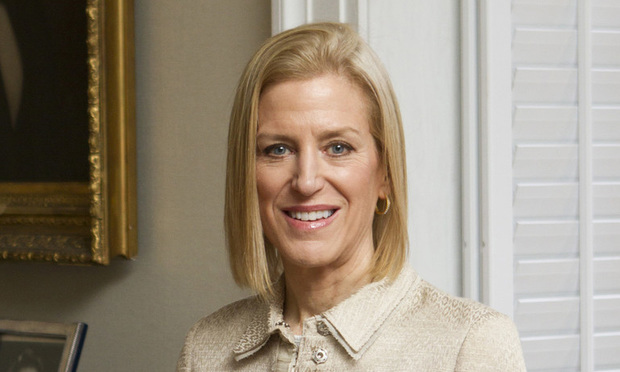Eleventh Circuit Draws Map for Qui Tam Recovery When Government Brings Criminal Charges
Judge Beverly Martin gave a tutorial on the workings of the U.S. False Claims Act in a 12-page opinion Wednesday joined by Eleventh Circuit Judge William Pryor and Senior Judge Bobby Baldock of the Tenth Circuit.
October 18, 2018 at 04:30 PM
6 minute read
 Judge Beverly B. Martin, U.S. Court of Appeals for the Eleventh Circuit (Photo: John Disney/ALM)
Judge Beverly B. Martin, U.S. Court of Appeals for the Eleventh Circuit (Photo: John Disney/ALM)
In a ruling dismissing a qui tam action, the U.S. Court of Appeals for the Eleventh Circuit explained how the whistleblower can still collect.
Judge Beverly Martin gave a tutorial on the workings of the U.S. False Claims Act in a 12-page opinion Wednesday joined by Eleventh Circuit Judge William Pryor and Senior Judge Bobby Baldock of the Tenth Circuit, sitting by designation. And Martin drew a map to collecting a relator's share even when a case is dismissed, as this one was, for lack of jurisdiction. The Eleventh Circuit considered the appeal under “provisional jurisdiction” which then “evaporates” with the opinion.
The whistleblower, or relator, is Lori Carver, who worked at a pain management clinic in Mobile, Alabama, when she discovered doctors submitting fraudulent payment claims to federal health care programs. Carver took that information to the office of the U.S. Attorney for the Southern District of Alabama, where she was encouraged to bring a qui tam action against the clinic and doctors, Martin said.
Carver is represented by a team of lawyers from Burns Cunningham & Mackey in Mobile. Gregory Vaughan of Holston, Vaughan & Rosenthal in Mobile spoke for her at oral arguments. Vaughan said Thursday he could not comment because of the pending litigation.
Christopher Scarborough of the attorney general's office in Washington argued for the federal government. He could not be reached immediately for comment.
“When a private person brings a False Claims Act suit—known as a qui tam action—the government may choose to intervene and take over the action,” Martin said. “It may also choose to pursue 'any alternate remedy available.'”
If the government pursues an “alternate remedy,” the False Claims Act gives the qui tam plaintiff the “same rights” in the “alternate” proceeding as she would have had if the qui tam action “had continued,” Martin said.
“Presented here is the question of whether this statute allows a qui tam plaintiff to intervene in criminal forfeiture proceedings when the government chooses to prosecute fraud rather than to intervene in the qui tam plaintiff's action,” Martin said. “Even if the False Claims Act could be read to allow intervention, the statutes governing criminal forfeiture specifically bar it, with exceptions that do not apply here. We conclude that the criminal forfeiture statutes control, and we agree with the district court's denial of Lori Carver's motion to intervene for that reason.”
But that wasn't the end of Martin's analysis.
“Our circuit precedent does not permit us to affirm, however,” Martin said. “On appeal of denial of a motion to intervene, our precedent provides for 'provisional jurisdiction' to determine whether the district court properly denied intervention,” Martin said. If the denial was correct, “jurisdiction evaporates because the proper denial of leave to intervene is not a final decision.”
So, with their jurisdiction having evaporated, the judges dismissed Carver's appeal for lack thereof.
By way of background, Martin explained that the False Claims Act imposes civil liability on any person who “knowingly presents … a false or fraudulent claim for payment or approval” to the federal government and allows the U.S. attorney general to sue for violations. A private person, called a relator, may bring a False Claims Act action “in the name of the Government,” which is known as a qui tam action. “The government may intervene to take over a qui tam action from the relator … but the relator 'shall have the right to conduct the action' if the government opts not to intervene,” Martin said. “Most of the recovery in a qui tam action goes to the government, to remedy the fraud. … But whether the government intervenes or not, a relator in a successful qui tam action is typically entitled to a share of the recovery. … This incentivizes people to come forward from the private sector with evidence of fraud perpetrated on the government.”
Carver continued to litigate her case alone after the government chose criminal prosecution rather than a civil action. Part of the question her appeal presented is whether the criminal case constitutes an alternate remedy. Martin said much of the government's case of criminal conspiracy against the doctors was built on Carver's disclosures. The U.S. attorney's office also added new charges and new defendants to create a racketeering and drug distribution case. The district court entered a forfeiture order to seize assets for restitution.
“Ms. Carver moved to intervene in the forfeiture proceedings, asserting a right to some of the forfeited assets. She primarily argued the alternate-remedy provision permits her to intervene to claim the share of the assets she would have been entitled to if the government had intervened in her qui tam action,” Martin said. “The government argued Ms. Carver has no right to intervene under the alternate-remedy provision because her qui tam case remains pending—meaning she has not yet established a right to a relator's share. It further asserted the False Claims Act does not permit intervention in criminal cases.”
The last part of the government's argument remains “an open question,” Martin said. The first part will likely be solved by time.
“A final word. Our ruling will not disable Ms. Carver from getting her relator's share. The government assured us in its brief that a ruling against intervention 'will not necessarily prevent a future recovery,'” Martin said.
Martin also quoted from the government's brief saying:
“Where a defendant is found civilly liable for damages in a False Claims Act suit after being found criminally liable for the same fraud, the defendant may deduct restitution paid to the United States in the criminal proceedings as a credit against the False Claims Act damages award. In such circumstances, a qualified relator is entitled to a share of the full amount of the damages award, including restitution previously paid.”
“We understand this to mean a relator is entitled to a share of the forfeited property to the extent the qui tam defendant can deduct any forfeiture from the qui tam award,” Martin said. “We expect the government will honor it.”
This content has been archived. It is available through our partners, LexisNexis® and Bloomberg Law.
To view this content, please continue to their sites.
Not a Lexis Subscriber?
Subscribe Now
Not a Bloomberg Law Subscriber?
Subscribe Now
NOT FOR REPRINT
© 2025 ALM Global, LLC, All Rights Reserved. Request academic re-use from www.copyright.com. All other uses, submit a request to [email protected]. For more information visit Asset & Logo Licensing.
You Might Like
View All
A Plan Is Brewing to Limit Big-Dollar Suits in Georgia—and Lawyers Have Mixed Feelings
10 minute read
On The Move: Kilpatrick Adds West Coast IP Pro, Partners In Six Cities Join Nelson Mullins, Freeman Mathis
6 minute read

Did Ahmaud Arbery's Killers Get Help From Glynn County DA? Jury Hears Clashing Accounts
Trending Stories
Who Got The Work
J. Brugh Lower of Gibbons has entered an appearance for industrial equipment supplier Devco Corporation in a pending trademark infringement lawsuit. The suit, accusing the defendant of selling knock-off Graco products, was filed Dec. 18 in New Jersey District Court by Rivkin Radler on behalf of Graco Inc. and Graco Minnesota. The case, assigned to U.S. District Judge Zahid N. Quraishi, is 3:24-cv-11294, Graco Inc. et al v. Devco Corporation.
Who Got The Work
Rebecca Maller-Stein and Kent A. Yalowitz of Arnold & Porter Kaye Scholer have entered their appearances for Hanaco Venture Capital and its executives, Lior Prosor and David Frankel, in a pending securities lawsuit. The action, filed on Dec. 24 in New York Southern District Court by Zell, Aron & Co. on behalf of Goldeneye Advisors, accuses the defendants of negligently and fraudulently managing the plaintiff's $1 million investment. The case, assigned to U.S. District Judge Vernon S. Broderick, is 1:24-cv-09918, Goldeneye Advisors, LLC v. Hanaco Venture Capital, Ltd. et al.
Who Got The Work
Attorneys from A&O Shearman has stepped in as defense counsel for Toronto-Dominion Bank and other defendants in a pending securities class action. The suit, filed Dec. 11 in New York Southern District Court by Bleichmar Fonti & Auld, accuses the defendants of concealing the bank's 'pervasive' deficiencies in regards to its compliance with the Bank Secrecy Act and the quality of its anti-money laundering controls. The case, assigned to U.S. District Judge Arun Subramanian, is 1:24-cv-09445, Gonzalez v. The Toronto-Dominion Bank et al.
Who Got The Work
Crown Castle International, a Pennsylvania company providing shared communications infrastructure, has turned to Luke D. Wolf of Gordon Rees Scully Mansukhani to fend off a pending breach-of-contract lawsuit. The court action, filed Nov. 25 in Michigan Eastern District Court by Hooper Hathaway PC on behalf of The Town Residences LLC, accuses Crown Castle of failing to transfer approximately $30,000 in utility payments from T-Mobile in breach of a roof-top lease and assignment agreement. The case, assigned to U.S. District Judge Susan K. Declercq, is 2:24-cv-13131, The Town Residences LLC v. T-Mobile US, Inc. et al.
Who Got The Work
Wilfred P. Coronato and Daniel M. Schwartz of McCarter & English have stepped in as defense counsel to Electrolux Home Products Inc. in a pending product liability lawsuit. The court action, filed Nov. 26 in New York Eastern District Court by Poulos Lopiccolo PC and Nagel Rice LLP on behalf of David Stern, alleges that the defendant's refrigerators’ drawers and shelving repeatedly break and fall apart within months after purchase. The case, assigned to U.S. District Judge Joan M. Azrack, is 2:24-cv-08204, Stern v. Electrolux Home Products, Inc.
Featured Firms
Law Offices of Gary Martin Hays & Associates, P.C.
(470) 294-1674
Law Offices of Mark E. Salomone
(857) 444-6468
Smith & Hassler
(713) 739-1250






